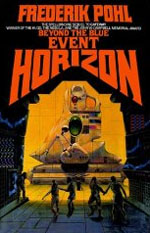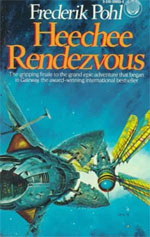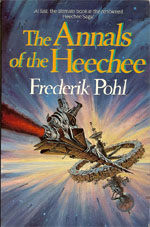 The first sensation I had while reading the sequels to the exemplary Gateway was one of disjointedness.
The first sensation I had while reading the sequels to the exemplary Gateway was one of disjointedness.
First, the narrative of Beyond the Blue Event Horizon jerks around in an uneven fashion. It’s one of those books where (a) there are multiple protagonists; (b) sometimes nothing interesting will be going on with one of those protagonists; but (c) the author feels compelled to periodically spend a chapter telling you about all the non-interesting stuff happening to that protagonist as if some sort of Equal Time for Equal Narrators (ETEN) lobby existed.
Second, the book is jarringly different from its predecessor. At first it feels as if it might be the different main characters or the different narrative focus creating the disparity, but eventually I figured out what was really going on.
Pohl switched genres.
The gritty, hard science fiction of Gateway is abruptly replaced with Golden Age Space Opera studded with Heinlein heroes. The fallible and interesting Robin Broadhead of Gateway is transmogrified into the Richest Man in the Universe married to the Beautiful Super Model Who Is Also A Genius. Together they fight crime and single-handedly solve all of the galaxy’s problems. Even the most ultimate and terminal of setbacks only result in giving the main characters superpowers.
Even this, by itself, wouldn’t necessarily be catastrophic. Unfortunately, it’s badly written space opera. This is Heinlein fan fiction by way of the brain eater.
 The entirety of Heechee Rendezvous, for example, consists of absolutely nothing important happening. A bloated cast of characters go caterwauling around the galaxy, but they never seem to actually accomplish anything. The entire “plot” of the novel, in fact, appears to be leading up to nothing more than a “surprise revelation”… which might make some sense, if it wasn’t for the fact that the “surprise” had already been revealed at the end of the last book. (It’s as if someone made Citizen Kane 2 as a film entirely focused around revealing to the audience that Rosebud is… wait for it… a sled.)
The entirety of Heechee Rendezvous, for example, consists of absolutely nothing important happening. A bloated cast of characters go caterwauling around the galaxy, but they never seem to actually accomplish anything. The entire “plot” of the novel, in fact, appears to be leading up to nothing more than a “surprise revelation”… which might make some sense, if it wasn’t for the fact that the “surprise” had already been revealed at the end of the last book. (It’s as if someone made Citizen Kane 2 as a film entirely focused around revealing to the audience that Rosebud is… wait for it… a sled.)
Pohl’s aping of Heinlein’s brain eater years includes his beautiful-and-brilliant protagonists having lots and lots of sex. Not because this has any relevance to the plot or elucidates the characters in any way, but just because Pohl really likes to tell us about all the hot, hot sex that his Mary Sues are having. It starts out puzzling, becomes annoying, and then resolves into boring.
The mysterious and enigmatic Heechee themselves are transformed into nothing more than a momentary (and largely irrelevant) speed bump for the Heroes to cruise over. This is part and parcel of the switch to over-the-top space opera (conforming to the “Humans Are the Awesomest Awesome That Ever Awesomed” branch of the genre), but is nonetheless a terrible, squandering waste of one of the most intriguing and evocative creations of the genre.
In many ways, Pohl’s failure with the Gateway sequels is very similar to Arthur C. Clarke’s failure with the Rendezvous with Rama sequels (except that Pohl doesn’t have a hack co-author to shoulder the blame). The first volume of each series is a beautiful exercise in engima, creating evocative riddles that provocatively suggest the contours of their solutions without ever providing concrete answers. They force every reader to provide their own closure to the questions they raise, creating an endless panoply of possible truths.
The sequels attempt to provide the definitive answers to every single question and (perhaps predictably) fail.
Perhaps it would be impossible to provide any answer as satisfactory as the non-answers we create for ourselves in reading the first books. But if they were going to try to answer those questions, I wish they’d come up with something more than vanilla pablum that could be found in dozens of other science fiction books before and since. You’ve got a blank check: Take some risks.
The only questions Pohl doesn’t try to answer in the Gateway sequels are those which he has apparently forgotten about. For example, in Gateway a relatively big deal is made out of a golden spiral device in the Heechee vessels — it lights up with sparkling light when the ship reaches the mid-point of a journey and gets hot at seemingly other random times. Nobody knows what it does, exactly, but everyone is very curious about what its true purpose might be.
In the sequels, however, it becomes nothing more than an indicator light and the mystery of its “true purpose” is completely forgotten.
But these types of raggedly hanging loose ends are just a rather specific example of a wider problem in the books: Huge, gaping continuity errors are to be found everywhere. Within any given volume these errors are usually of only a minor sort, but between volumes the Gateway sequels fail to have any sort of consistency. For example, in the last five pages of Heechee Rendezvous you are authoritatively told that characters X and Y have gone to location A. Within the first five pages of the next book, only character X has gone to location A and character Y has instead been killed off-screen in a helicopter accident. Similarly, an entire ship full of people is miraculously resurrected because Pohl apparently forgot that he killed them all in the previous book.
 These books are, in the final analysis, a complete and utter failure. By the time The Annals of the Heechee blatantly breaks the fourth wall, thus shredding any credibility the books have left, the sequels have already firmly established themselves as the literary equivalent of Highlander 2: Exercises in mediocrity interrupted only by stretches of atrocious self-indulgence which you would be well-advised to avoid even on their own sub-par merits. At the same time, they are the sort of work whose existence you must scour from your own mental reservoirs in order to enjoy the excellent work which lamentably gave them birth.
These books are, in the final analysis, a complete and utter failure. By the time The Annals of the Heechee blatantly breaks the fourth wall, thus shredding any credibility the books have left, the sequels have already firmly established themselves as the literary equivalent of Highlander 2: Exercises in mediocrity interrupted only by stretches of atrocious self-indulgence which you would be well-advised to avoid even on their own sub-par merits. At the same time, they are the sort of work whose existence you must scour from your own mental reservoirs in order to enjoy the excellent work which lamentably gave them birth.
The fact that Gateway is a better novel than Highlander is a movie only makes it worse.
And the quality of the Gateway sequels continues to deteriorate from one volume to the next.
For example, I have a pet peeve about authors who feel the need to summarize the plots of the previous books in a series. First, it is unlikely that anyone is picking up Book 3 of a seven book series without having already ready Book 1 and Book 2. Second, the little snippets of information presented in awkward expository lumps they do include are insufficient to the task of bringing new readers “up to speed” — which means that (a) the extant readers are bored and (b) the new readers are still lost.
Some authors in series with less tightly-woven continuity do an excellent job of incorporating such details through the simple expedient of writing each book as if it were a stand-alone narrative. One of the tricks here is that they don’t try to summarize the plots of other books. Instead they simply drop in the necessary details from their protagonists past lives just as they would with any such detail. The difference is subtle and requires a certain mastery of your craft. Bujold, for example, has practically perfected the technique.
Pohl, unfortunately, has not.
What begins as a predictable drag on the narrative pace of the books eventually becomes something ludicrously disastrous: My copy of The Annals of the Heechee is 275 pages. Despite this brief length, 100 of the first 120 pages are spent finding clumsy ways to reiterate the narrative from the previous three books. And much of this material is studded with the familiar (yet baffling) errors of continuity.
Combined with the fact that Pohl treats his readers like idiots (by repeating the same bits of exposition over-and-over again just in case we missed it the first time) and structures his narratives around solving “mysteries” by revealing things that he he already revealed in the previous book the entire series quickly becomes completely interminable.
In short: Yes, that is an actual F- on The Annals of the Heechee. It deserves it.
GRADES:
BEYOND THE BLUE EVENT HORIZON: C-
HEECHEE RENDEZVOUS: D-
THE ANNALS OF THE HEECHEE: F-
Frederik Pohl
Published: 1980 / 1984 / 1987
Publisher: Del Rey
Cover Price: $14.95
ISBNs: 0765321777 / 0345300556 / 0345325664
Buy Now!











